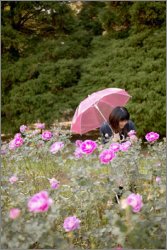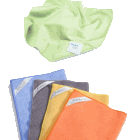12 Tips to Minimize Allergies During Peak Allergy Season
by www.SixWise.com
Over half of Americans (more than 50 million people) are
allergic to one or more allergens, according to the American
Academy of Allergy, Asthma & Immunology (AAAAI). And never
is it more apparent than during the springtime, when seasonal
allergies are likely to flare up.
|

As pollen and other allergens peak this spring, those
with allergies should stay indoors as much as possible
(or if you can't resist venturing outside, at least
shower and wash your clothing afterward).
|
Aside from the lousy, cold-like symptoms that allergies provoke
(sneezing, congestion, watery/itchy eyes, runny nose, etc.),
allergies can cost you days at work and money to seek out
solutions. In fact, according to AAAAI, allergies may cost
Americans close to $8 billion a year in costs related to direct
care and lost work productivity.
The good news is that there are a number of ways to ease
your outdoor allergies that don't cost much money and that
don't take much effort to do. If you are one of the many people
battling with seasonal allergies this spring, try out as many
of the tips below as you can ... and you should experience
a great deal of relief.
Minimize Your Allergies With These 12 Tips
1. Keep your windows closed to keep pollen out (this is especially
important from 5 a.m. to 10 a.m. when plants release most
of their pollen).
2. Use your air conditioner instead of opening windows, and
ideally use an air conditioner that has an allergy-reducing
HEPA filter in it.
3. Check the daily pollen and mold counts (AAAAI's National
Allergy Bureau has daily
pollen counts for locations across the country). If counts
are high, stay indoors as much as possible. Also stay indoors
if it's windy, as dust and pollen will be blown about.
|

Keeping your windows closed (and the air conditioning
on instead) will help to keep pesky allergens outside
where they belong.
|
4. Clean your home frequently to reduce pollen, mold, dust
and other allergens. The PerfectClean
line of mops, dusters, towels and more, which is used
by leading hospitals and other health care organizations,
is ideal for this. Rather than just pushing dust around, or
worse, stirring it up into the air, PerfectClean's
EasyGrip Mop and Flexible
Duster are made with positively charged ultramicrofibers
that pick up everything in their path -- including dust and
all of its microscopic attachments.
5. Wash
your bedding once a week in hot water to help get rid
of dust mites and other allergy triggers. Even better, throw
in a 100%
Hypoallergenic Static Eliminator Reusable Dryer Sheet
with your dryer load to take static cling out and soften fabric
-- without any toxic chemicals whatsoever.
6. Shower before you go to bed. This will help wash away
any pollen, mold and other allergens that have accumulated
in your hair and on your body.
|
Keep Your Home Clean With PerfectClean
Cloths, Dusters and Mitts

PerfectClean is the line of cleaning tools that leading
hospitals and health care organizations use for several
reasons:
- The ultramicrofiber construction picks up far more
dust, dirt and biological contaminants than any other
cleaning tool, so your home is significantly cleaner
- Unlike chemical cleaners and typical mops and sponges,
which are loaded with germs, PerfectClean products
are 100% safe due to their ultramicrofiber construction
- Hospitals and other organizations use them 100
times or more ... so they will save you money as you
can eliminate chemical cleaners and avoid constantly
replacing towels, mop heads, etc.
Due to the positively charged ultramicrofibers, these
cloths, mops and dusters pick up everything in their
path including dust, crumbs, pet hair, lint and contaminants
invisible to the naked eye. Use them wet or dry -- only
water is needed!
Read
More and Order Your PerfectClean Cleaning Tools Now!
|
7. Always wash your clothes after spending time outdoors
to remove pollen and other allergens.
8. Keep your windows rolled up while driving.
9. Have someone else mow
your lawn. Cutting the grass
will expose you to a host of pollens and molds (the same goes
for raking leaves in the fall).
10. Wipe off surfaces you touch often. Surfaces such as computer
keyboards, countertops, furniture, door handles and appliances
can be loaded with allergens. When you touch these areas,
the allergens are transferred to your hands and then likely
to your eyes, nose and mouth, potentially worsening your symptoms.
Giving these areas a quick wipe with PerfectClean
high-quality, commercial-grade microfiber cloths will
keep all types of allergens to a minimum.
11. Resist the temptation to hang your clothes out in the
sun to dry. When you bring them inside, they'll be covered
in pollen and mold.
12. Get away for a while. If you can spare a few weeks, great,
but even a week-long
vacation to a low-pollen area (such as a beach) can be
a much-needed reprieve.
Recommended Reading
50%
of U.S. Population Has Allergies, Most Don't Realize It &
Suffer Unnecessarily ... Do You?
Chronic
Sinusitis: What it is, What the Symptoms Are, Common Treatments,
Potential Cures
Sources
American
Academy of Allergy, Asthma & Immunology